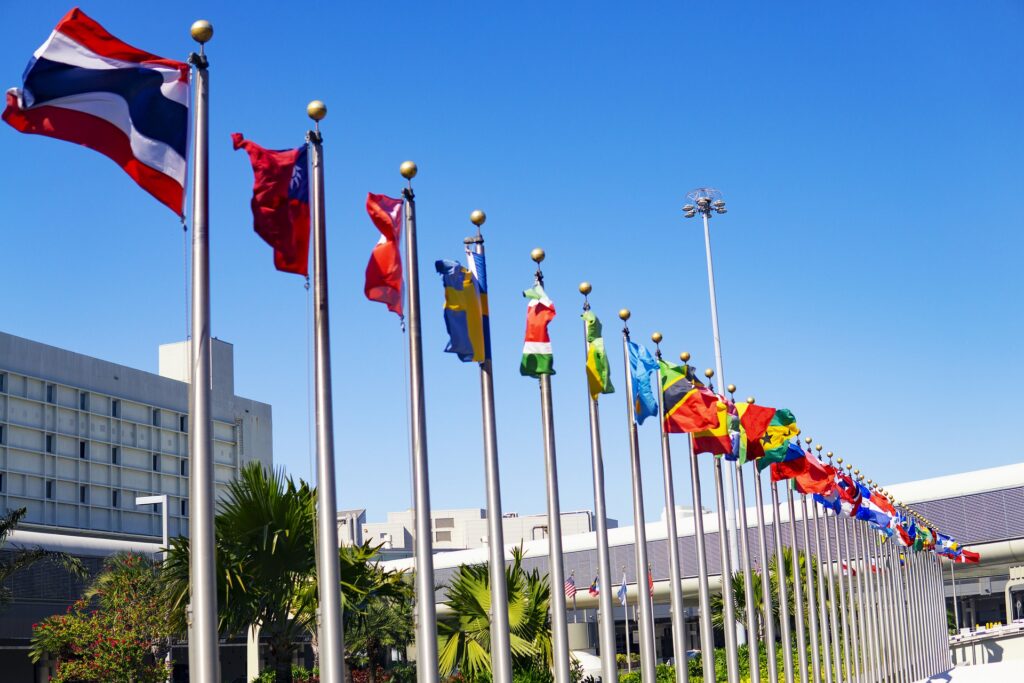By: Sumaya Hussaini, Emily Lieberman
The 2020 presidential election will serve as one of the most influential elections in recent history, and will undoubtedly impact foreign affairs. Not only will this election determine how the United States works to address critical international challenges at home and abroad, it will also define U.S. diplomatic efforts for years to come. Here are the top ten international issues to look out for in November and why every voter should pay attention to the impacts and outcome of these pressing issues.
- COVID-19
The coronavirus knows no borders, and almost every country has been affected, including the United States. The ongoing pandemic has infected more than six million Americans and killed nearly 190,000, and polls suggest that COVID-19 will be a dominant issue in the election. The virus impacts everyone — healthwise, economically, educationally and environmentally — and nearly every American holds a strong opinion about how President Trump has handled the outbreak. An investigation revealed that Trump ignored experts about COVID-19 warning signs and dismissed early suggestions to institute social distancing guidelines.
While it is predicted that Trump’s response to COVID-19 will sway voters, two-thirds of Americans believe it is likely that the outbreak will significantly hinder people’s ability to vote. With Trump attacking the U.S. Postal System and utilizing rhetoric to claim that allowing people to vote by mail will result in a corrupt election, the threat of contracting COVID-19 may affect voter turnout, especially among voters who are at higher risk of serious complications if they contract the virus. Attitudes about the conduct of elections are highly partisan; 87% of Republicans are confident that all citizens who want to vote will be able to do so, with Democrats only at 43%. With November fast approaching, it is evident that the pandemic will be on voters’ minds while at the polls.
- Climate Change
The past decade is recorded to be the warmest in history, with deadly wildfires, hurricanes, and extreme weather events regularly devastating many parts of the world. In 2018, the United States produced the second most greenhouse gas emissions in the world behind China, indicating that domestic U.S. policy impacts climate change worldwide. Experts agree that cumulatively, the United States has contributed more to climate change than any other country, bringing the issue home for many Americans. The existential threat is now close to the top of Democratic voters’ priorities and climate change has become important enough to Americans that concern remains steady despite other national emergencies, such as the COVID-19 pandemic and subsequent economic crisis. Research shows that climate change is taken seriously by Democrats of all ages, with a generational divide present among Republicans, as millennials and Gen Z Republicans are more likely to think that humans contribute to climate change.
The number of voters deeply engaged on the issue of climate change is rising sharply. The entrance poll for the Democratic caucuses revealed that climate change was second only to healthcare for voters. Presidential candidate Biden is utilizing the changing climate as a core campaign issue and fundraising focus in order to counter Trump’s fossil fuel donations. While Biden vows to rejoin the Paris Climate Agreement and make the U.S. the world’s clean energy superpower, a second Trump term would have severe and irreversible changes to the climate, as the administration is devoted to its allies in the fossil fuel industry.
- U.S.-Iran relations
In 2015, Iran reached a nuclear deal with the P5+1, a group of world powers composed of the United States, United Kingdom, France, China, Russia, and Germany. Under the accord, Iran agreed to limit its nuclear program and allow international inspections. Trump abandoned the deal in 2018 and reinstated US sanctions that targeted both Iran and states that trade with it, resulting in a downturn in Iran’s economy. In January, a U.S. drone strike in Iraq killed Qasem Soleimani, an Iranian general. As a result, Iran responded by targeting US troops with missile strikes in Iraqi bases, further escalating tensions. With heightened friction between the two countries as November approaches, what does the upcoming presidential election mean for the future of US-Iran relations?
If elected, Biden has stated that he will pursue a diplomatic approach towards Iran and re-enter the Joint Comprehensive Plan of Action (JCPOA), which was abandoned by the Trump administration. Biden has also stated that he will provide sanctions relief while working with US allies in Europe to extend the deal’s nuclear constraints. If Trump is re-elected, his administration is predicted to continue implementing a maximum pressure strategy, risking escalation with little hope for diplomacy. The outcome of the U.S. 2020 presidential election will determine the fate of U.S.-Iran relations and have far-reaching consequences for the international order.
- Sustainable Development
With a decade left to deliver the 2030 United Nations Sustainable Development Goals (SDGs), the upcoming American presidential election will help decide the fate of the international agenda. With poverty and mortality rates on the decline, the world has made substantial progress, however, it is still off track to realize the global goals by the end of this decade.
In 2019, the UN General Assembly came together to assess progress on the SDGs since their adoption in 2015. The U.S. was the only Organization for Economic Cooperation and Development and G-20 country that did not volunteer to report on its SDG progress. While many American cities, universities, corporations, and NGOs have embraced the SDGs to advance social and environmental progress across the U.S., governmental leadership is lacking under the Trump administration.
Given the U.S.’s status as a world leader, the outcome of this election will shape global progress on the SDGs. A Trump re-election would result in further reluctance to engage in multilateralism or be a leader in sustainable development, while a Biden presidency would reinforce the Obama administration’s steadfast commitment to sustainable development and energy. As stated in his policy goals, Biden would implement his Sustainable Infrastructure and Clean Energy Plan, which aims to achieve economy-wide net-zero emissions by 2020.
- Israel-Palestine conflict
Since taking office in 2016, Trump has strengthened U.S. relations with Israel by recognizing Jerusalem as Israel’s capital in 2017 and moving the U.S. embassy there from Tel Aviv the following year. Most recently, Trump announced the normalization of relations between Israel and the UAE in August, handing his re-election campaign a much-needed foreign policy win by reminding conservative voters of his campaign promises.
However, Trump’s consistent pro-Israel stance has infuriated progressive voters who believe the president has discarded the longtime goal of granting Palestinians a full-fledged state. Although Trump said in 2018 that he wants a two-state solution, his Secretary of State Mike Pompeo declined to publicly reaffirm that the Trump administration still backs a two-state solution when asked in 2019. Meanwhile, Democratic nominee Biden said he would push for a two-state solution to guarantee long-term security for Israel while ensuring national self-determination for Palestinians. The Israel-Palestine conflict will be a critical issue in the upcoming presidential election for voters who believe that the looming annexation of occupied West Bank territories is a violation of international law and, on the other hand, those who believe Trump’s Middle East plan is key to U.S. geopolitical strategy abroad.
- U.S.-China Relations
The increasingly confrontational relationship between the United States and China continues to dismantle decades of political, economic, and cultural exchange. Tensions have risen as Trump continues to blame China for the spread of COVID-19, having cited the virus as “kung flu” at a rally, and continuously calling it the “Chinese Virus”. There are also growing concerns about China’s Belt and Road Initiative, repression of the country’s Uighur population, and China’s continuous growth as a political power. Now, roughly two thirds of Americans say they hold unfavorable views towards China. American’s are worried about the trade war, environmental degradation, China’s human rights policies, and U.S. job losses.
With Trump trailing in national polls in recent weeks, the United States’ relationship with China only is strained further. Both Democrats and Republicans are concerned about China’s growing international power, but the Republican party is working to reframe the conversation against Democrats. This tactic of legitimizing and exaggerating China as a challenge to the United States, and then accusing Democrats of not aggressively fighting back against a foreign threat, is one that has historically led to the United States’ involvement in numerous international conflicts. Biden has responded by attacking Trump for being insufficiently nationalist, and that the Republican party has not done enough to also fight against China as a foreign threat. Biden’s stance is to outhawk the Republican party at their own game, potential undermining progressive goals. Voters should continue to follow the U.S.-China relationship, as it will be permanently defined by the outcome of the 2020 election and could result in increased conflict and tension between the two world superpowers.
- The Trade War
Across the political spectrum, warnings have appeared that Trump’s trade war is hurting the United States and the global economy. For most of the past century, tariffs have fallen out of favor in U.S. policy since they often lead to retaliation from abroad, reduced trade, and higher prices for U.S. consumers. The U.S.-China trade war began in 2016 with Trump claiming China was one of the primary reasons for the loss of U.S. manufacturing jobs.
The $200 billion phase one trade deal between China and the United States, agreed on in early 2020, has ultimately failed to achieve its goal of resolving economic fallouts from the multi-year trade war. China was only able to purchase 23% of the target amount for the year, leaving the U.S. in a potentially more damaging economic position. Biden believes the U.S. needs to take a more aggressive stance towards China and assist in building a global trade united front to block China’s ability to ignore half of the global economy. Additionally, in 2018, 45% of Americans thought the tariffs imposed by the U.S. and China on each other would be more harmful than helpful to the U.S. economy in the long term, with 57% of Democrats believing the tariffs have already made the economy worse, with both polls indicating voters concerns of the trade war’s implications. Republicans alternatively were convinced tariff would make the economy better in the long run with over 60% holding this view.
The trade war will continue to be defined by U.S.-China relations. With tensions increasing, COVID-19 still rampant, and continuous polarization among Democrats and Republicans over how to conduct relations, this trade war has no clear end in sight. The economy is a top issue for voters in the 2020 election, and with November rapidly approaching, this trade war could cause a disastrous economic fallout.
- U.S. Diplomacy and Foreign Aid
Since taking office in 2016, Trump has authorized deep cuts on foreign assistance programs and pulled out of numerous international alliances. In February 2020, Trump proposed $4.8 trillion in spending cuts for fiscal year 2021, including a slash in foreign aid of 21%. Additionally, Trump pulled out of the United Nations Human Rights Council, withdrew from the United Nations Educational, Scientific, and Cultural Organization, and terminated the United States relationship with the World Health Organization, cutting off all U.S. funding in the midst of the global pandemic.
These withdrawals have led to numerous international ramifications including loss of reputation, a diminished ability to lead and enforce U.S. positions on policy, and the potential for contagion in which there is a precedent for other countries to follow the U.S. in suit. Biden argues the U.S. should be leading a coordinated global response to fight the coronavirus, and contends that the U.S. should maintain its alliances. Additionally, roughly 73% of Americans believe good diplomacy is the best way to maintain peace, and 63% believe the U.S. should take the interests of allies into account when conducting foreign policy. Continuing alliances with U.S. allies and maintaining good diplomacy on the global scale is important to a majority of Americans.
With Trump’s expressed interest in pulling out of the North Atlantic Treaty Organization, the issue of U.S. diplomacy and foreign aid should be on every voter’s mind. Will the rest of the world consider these last four years a blip in American politics, or will the rest of the world assume this is the trajectory of U.S. politics for generations to come? Regardless of who is elected to office in November, the United States will be forced to recover its international image and determine what its core values and priorities are.
- U.S.-Venezuela Relations
On January 10, 2019, President Nicolás Maduro assumed the presidency of Venezuela in extreme controversy. The lack of free and fair elections combined with Maduro’s use of unethical methods for social control have allowed Maduro to remain in power and manipulate the electoral process to his advantage. More than 3 million Venezulans have fled the country, with 90% of families reporting that they are unable to buy enough food. On September 16th 2020, the United Nations Human Rights Council released a report detailing numerous human rights violations by Maduro and the Maduro administration.
The United States recognizes Interim President Juan Guaidó as the legitimate president of Venezuela, with nearly sixty other countries joining in recognition. The Trump administration is attempting to use more than $300 million frozen Venezuelan government funds in order to oust President Nicolás Maduro and continue to promote the United State’s stance. Biden has indicated as president that he would extend Temporary Protected status to Venezuelans, a designation the Trump administration has not guaranteed.
The problems between the United States and Venezuela should be on every voter’s mind come November, as the U.S. stance towards Venezuela will help to shape foreign policy and human rights affairs in Latin America for years to come.
- Cybersecurity
Prior to the 2016 election of Trump, the FBI contacted the Democratic National Committee to inform their IT department that at least one computer had been compromised by Russian hackers. This set off a storm of political turmoil, leading to the Muller investigation into Russia’s interference in the 2016 election, and numerous social media scandals from companies. In particular, Facebook reportedly sold $100,000 in ads during the presidential election cycle from inauthentic accounts and pages “likely operated out of Russia”.
In September, Microsoft reported that the Russian military intelligence units, which attacked the DNC four years prior, are back with new hacks aimed at both Democrats and Republicans. However, thus far, there is no evidence these hacks have been successful. The active targeting of the U.S. election system should be on the mind of every voter this fall. Not only do these attacks lead to the spread of misinformation, but they can sway the election to harm the United States politically and economically. The use of covert influence measures will alter U.S. voters preferences and perspectives, shift U.S. politics, and undermine American’s confidence in the democratic process overall. Lapses in cybersecurity could determine the results of the election, leaving voters to question where their information is coming from, what their news sources are telling them, and why their vote matters in this upcoming election.
–
Not only will the outcome of the 2020 presidential election be a defining factor in the United States’ ability to engage on the world stage, but it will redefine American politics and diplomacy for the near future. Every voter should pay attention to U.S. foreign policy and the U.S.’ international image this November.
Global affairs may not be a top issue or priority for all voters, but these very global challenges will shape the lives of many Americans for years to come. As one of the world’s superpowers, the United States has the ability to shape foreign policy and forge a path toward international cooperation. Voters should head to the polls this fall questioning how their vote will impact crises across the globe.







